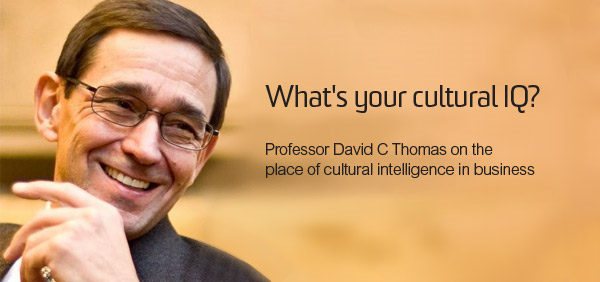The AGSM kicked off this year’s Learn@Lunch series on 19 February 2014 with an enticing question:
The question was being asked by David C. Thomas, PhD, who is currently Professor of International Business in the School of Management at the Australian School of Business, University of New South Wales. An accomplished academic, he is also the author of eight books, including … wait for it … Cultural Intelligence: Living and Working Globally.
Cultural Intelligence explained
Dr Thomas defines Cultural Intelligence as one’s ability to deal effectively with the cultural aspects of their environment. This important because as we become increasingly globally interconnected, we need to interact more and more frequently with people of other cultures. It is impossible to understand all cultures, and indeed to even comprehend more than a few (except superficially). As Dr Thomas points out, many well rounded, socially and emotionally intelligent people struggle with cross-cultural interaction.
The good news however, is that Cultural Intelligence can be developed using three interrelated elements: Knowledge, Skills and Mindfulness.
Knowledge
This element of Cultural Intelligence is about understanding what culture is. At minimum, it is an abstract understanding of the concept of culture – as in being aware that others may be culturally different to oneself. In practice, it means having working knowledge of the details and nuances of the particular culture one needs to interact with. It also requires the ability to distinguish between personal behaviour and societal norms.
Skills
These are the behavioural meta-skills needed to become more culturally intelligent:
- Perceptual Acuity – sharpness of perceiving details around you
- Empathy – the ability to understand and share the feelings of another
- Tolerance for ambiguity
- Relational Skills – being able to relate to others
- Adaptability
As you become more competent at these, you can select which ones to use in a situation requiring cultural tact.
Mindfulness
Finally, this is the mediating step that links knowledge with skills. It is essentially the opposite of mindlessness, where you are simply unaware of your cultural context. It lets you stop, take account of the situation you’re in, recall the knowledge about your context, and then apply your behavioural meta-skills to behave in a culturally appropriate way.
An interesting example: Carlos Ghosn – A (culturally) smart cookie
One of the more fascinating examples of someone with high Cultural Intelligence Dr Thomas gave was Carlos Ghosn, the President and Chief Executive Officer of Nissan Motor Co., Ltd. Ghosn is a French-Lebanese-Brazilian who is largely credited with one of the most dramatic downsizing and turnarounds of a major organisation in the modern business era. What’s even more fascinating is that he runs this massive multi-national by splitting his time evenly between Tokyo and Paris, both places steeped in distinct, rich cultures and business customs.
Ghosn’s management style is frequently described as cross-cultural, and he credits his ability to navigate between cultures as one of his strengths. In his CEO message on the Nissan Global website he points out that cultural diversity can create a competitive advantage, saying that “solutions come from using the talents of both men and women, young and old, from all levels in the organization or from different cultures.”
He even has his own superhero comic book series. That’s right – “The True Life of Carlos Ghosn”. (I’m trying to imagine a comic book based on my life. Probably wouldn’t be as exciting.)
Experiencing different cultures
The lecture really resonated with me since I have worked in a number of situations that have required interacting with people with different cultural backgrounds, and reflecting on those situations makes me realise how important cultural intelligence really is.
Local interactions
One of the things I love about living in Sydney is the exposure and ability to interact with a plethora of cultural backgrounds. I’ve been privileged to work in a number of organisations where many of my colleagues had different ethnic backgrounds and upbringings. This also provides some interesting challenges.
For example, I once worked with a number of Japanese colleagues for a couple of years. It was my first time interacting closely with people of Japanese background, and I remember getting very frustrated. We would spend lots of time in deep and intense discussions, which would mostly end in what I thought was an agreement. Later, I would find out that they would renege on that agreement or deny having reached it at all.
After a few of these events, it occurred to me that the reason for this misunderstanding was largely cultural: when they nodded during our discussions, they were just being polite and letting me have my say. Whereas I had taken their nods to mean acceptance, they were simply nodding in acknowledgement of having heard my point of view.
Once I realised this, I had to change my approach to incorporate this cultural understanding. I re-framed the conversations to try to get their points of view out without trying to push mine first, and making sure at any agreement we reached as actually explicitly acknowledged as such.
Remote interactions
Working for a global companies is also an interesting exercise in cultural awareness, where many of your colleagues are from and located in different parts of the world. Not only are they from a different culture, they are in a different culture and of course behave within its norms.
Being culturally intelligent can be very helpful here, not only to foster strong relationships across the organisation, but also to be effective in your job if it requires frequent cross-regional interactions.
For example, when rolling out changes to business processes or technology systems, it can really help to be aware of how different cultures react. I’ve found that changes are better implemented via mandate in certain parts of the world, while others require more of a co-opting approach.
Organisations as Cultural Containers
While not quite the idea that Dr Thomas was talking about, each organisation has its own unique culture as well. I’ve worked in a large variety of organisations, from two person to 10,000 strong consulting firms, government departments, financial services institutions and global system integrators while covering a wide range of industries. While industry norms exist, company culture usually varies significantly between organisations of the same size in the same market. Many of the ideas discussed in the lecture can be adapted to a micro-level and used to intelligently navigate the culture within the specific place you work at.
Takeaways
All this made me think about how real this is as an actual, practical concept, not just an academic one. Certainly in Australia, the importance of being able to effectively interact with our neighbouring countries has recently gained much prominence. This is highlighted in publications such as Australia in the Asian Century, which was mentioned by both David Thodey as well as Andrew Stevens, and also discussed by Professor Joseph Cheng.
In the end, however, the best reason to develop your Cultural Intelligence is to be able to more effectively deal with people of other cultural backgrounds. As Stephen Covey said, “seek first to understand, then be understood“.



Nice post, Syed. I can certainly relate to your point about companies having their own unique culture. Having recently started a new gig, I found myself taking several weeks to observe what is and isn’t acceptable in terms of behaviour.
As a technologist and avid learner, I also find that this type of learning satiates the same hunger for knowledge as more tangible technical learning. In other words – mindful cultural learning pays off in many ways.